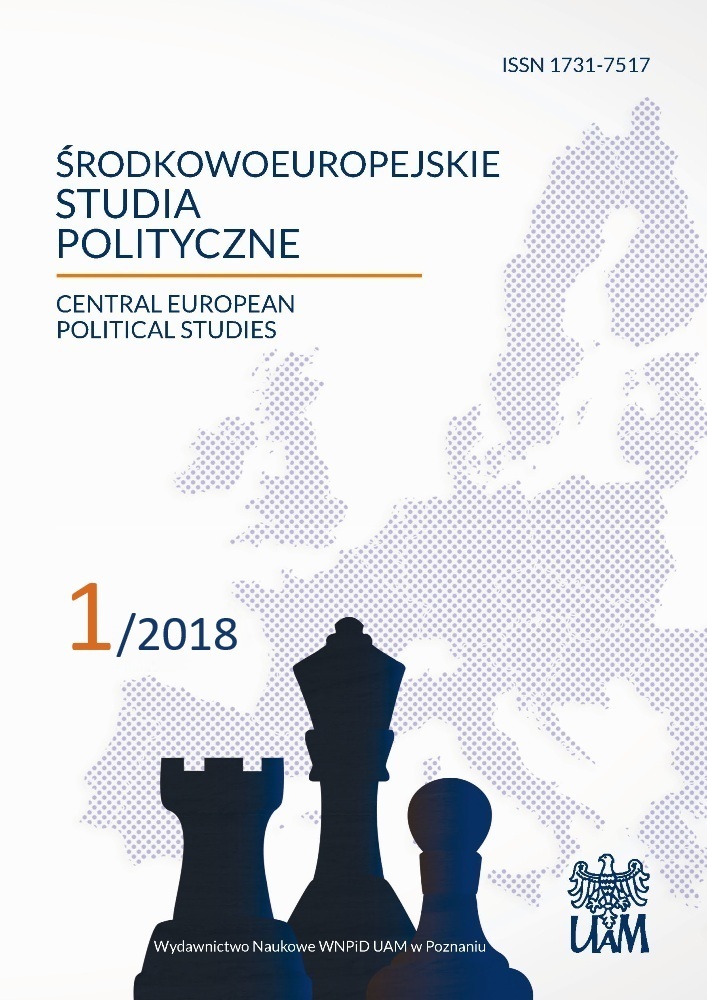Abstract
The importance of ethnicity in many areas of contemporary political and social life is increasing rather than decreasing. Ethnicity still remains an important source of conflicts in the internal politics of states, often leading to the outbreak of armed conflicts. This article attempts to conceptualize the conditions of modern ethnopoliticalconflicts in which ethnic differences lie at the heart of the division between the parties in its historical, ethno-demographic, socio-economic, socio-cultural and political dimensions.References
Baird A. (1999), An Atmosphere of Reconciliation – A Theory of Resolving Ethnic Conflicts Based on the Transcaucasian Conflicts, “The Online Journal of Peace and Conflict Resolution”, issue 2.4.
Blagojevic B. (2009), Causes of Ethnic Conflicts: A Conceptual Framework, “Journal of Global Change and Governance”, vol. III, no. 1.
Bodio T. (2010), Etnokracja w Azji Centralnej, w: Przywództwo i elity polityczne w krajach WNP, red. T. Bodio, W. Jakubowski, t. 2, Oficyna Wydawnicza ASPRA-JR, Warszawa.
Chałupczak H., Browarek T. (1998), Mniejszości narodowe w Polsce 1918–1995, Wydawnictwo Uniwersytetu Marii Curie-Skłodowskiej, Lublin.
Cornell S. E. (2002), Autonomy and Conflict. Ethnoterritoriality and Separatism in the South Caucasus – Cases in Georgia, Uppsala University, Uppsala 2002.
Denny E. K., Walter B. F. (2014), Ethnicity and Civil War, “Journal of Peace Research”, vol. 51(2).
Fox J. (1999), Towards a Dynamic Theory of Ethno-religious Conflict, “Nations and Nationalism”, vol. 5, no. 4.
Fox J. (2004), The Rise of Religious Nationalism and Conflict: Ethnic Conflict and the Revolutionary Wars, 1945–2001, “Journal of Peace Research”, vol. 41, no. 6.
Ghebali V. Y. (1999), Ethnicity in International Conflicts. Revisiting an Elusive Issue, w: Towards the 21st Century. Trends in Post Cold-War International Security Policy, red. K.R. Spillmann, A. Wenger, “Studies in Contemporary History and Security Policy”, vol. 4.
Gurr T. R. (1970), Why Men Rebel, Princeton University Press, Princeton.
Hague W., Ellingsen T. (1998), Beyond Environmental Scarcity: Casual Pathways to Conflict, “Journal of Peace Research”, vol. 35, no. 3.
Hegre H., Ellingsen T., Gates S., Gleditsch N. P. (2001), Toward a Democratic Civil Peace? Democracy, Political Change, and Civil War, 1816–1992, “American Political Science Review”, vol. 95, no. 1.
Horowitz D. L. (1998), Structure and Strategy in Ethnic Conflict, http://siteresources.worldbank.org/DEC/Resources/84797-1251813753820/6415739-1251813951236/horowitz.pdf, 11.09.2017.
Humphreys M. (2003), Economics and Violent Conflict, http://www2.unicef.org/socialpolicy/file/Economics_and_Violent_Conflict.pdf, 14.09.2017.
Humphreys M. (2005), Natural Resources, Conflict, and Conflict Resolution. Uncovering the Mechanisms, “Journal of Conflict Resolution”, vol. 49, no. 4.
Jenne E. K., Saideman S. M., Lowe W. (2007), Separatism as a Bargaining Posture: The Role of Leverage in Minority Radicalization, “Journal of Peace Research”, vol. 44, no. 5.
Kaldor M. (2013), In Defence of New Wars, “Stability”, 2(1):4, http://dx.doi.org/10.5334/sta.at, 15.09.2017.
Kalyvas S. N., Kocher M. A. (2007), Ethnic Cleavages and Irregular War: Iraq and Vietnam,“Politics&Society”, vol. 35, no. 2.
Kaufmann Ch. (1996), Intervention in Ethnic and Ideological Civil Wars: Why One Can Be Done and the Other Can’t, “Security Studies”, vol. 6, no. 1.
Kwaśniewski K. (1994), Konflikty etniczne, „Sprawy narodowościowe. Seria nowa”, t. 3, z. 1.
Levy J. S. (1998), The Causes of War and the Conditions of Peace, „Annual Review of Political Science”.
Malendowski W. (2004), Spory i konflikty międzynarodowe, w: Stosunki międzynarodowe, red. W. Malendowski, C.Mojsiewicz, Atla 2, Wrocław.
Pietraś M. (2006), Istota i specyfika konfliktu niskiej intensywności, w: Konflikt niskiej intensywności w Naddniestrzu, red. M. Celewicz, J. Kłoczowski, M. Pietraś, Instytut Europy Środkowo-Wschodniej, Lublin.
Polak A. Paździorek P. (2011), Wojna, konflikt, kryzys, Akademia Obrony Narodowej, Warszawa.
Riggs S. W. (1995), Ethnonational Rebellions and Viable Constitutionalism, “International Political Science Review”, vol. 16, no. 4.
Rummel R. (1995), Democracies ARE Less Warlike Than Other Regimes, “European Journal of International Relations”, no. 1.
Sambanis N. (2001), Do Ethnic and Non-Ethnic Conflicts Have the Same Causes?: A Theoretical and Empirical Inquiry, “The Journal of Conflict Resolution”, vol. 45, no. 3.
Sanin F. G., Wood E. J. (2014), Ideology and Civil War: Instrumental Adoption and Beyond, “Journal of Peace Research”, vol. 51(2).
Slack J. A., Doyon R. R. (2001), Population Dynamics and Susceptibility for Ethnic Conflict: The Case of Bosnia and Herzegovina, “Journal of Peace Research”, vol. 38, no. 2.
Stankiewicz W. M. (2008), Konflikt jako zjawisko integrujące i dezintegrujące oblicze współczesnego świata, Wydawnictwo Uniwersytetu Warmińsko-Mazurskiego w Olsztynie, Olsztyn.
Toft M. D. (2014), Territory and War, “Journal of Peace Research”, vol. 51(2).
USAID (2002), A Strategy Addressing Conflicts in Eastern Europe and Eurasia, http://pdf.usaid.gov/pdf_docs/Pdabx615.pdf, 20.09.2017.
Wallensteen P. (2002), Understanding Conflict Resolution. War, Peace and the Global System, Sage, London–Thousand Oaks–New Delhi.
Wierzbicki A. (2014), Etniczność i narody w Europie i Azji Centralnej. Perspektywa teoretyczna i egzemplifikacyjna, Wydział Dziennikarstwa i Nauk Politycznych UW, Warszawa.
Wierzbicki A. (2010), Przywództwo i elity krajów WNP w perspektywie badań etnopolitycznych, w: Przywództwo, elity i transformacje w krajach WNP. Problemy metodologii badań, red. T. Bodio, t. I, Oficyna Wydawnicza ASPRA-JR, Warszawa.
Zenderowski R. (2011), Pamięć i tożsamość narodowa, „Atheneum. Polskie Studia Politologiczne”, vol. 28.
Zenderowski R. (2012), Religia, etnonacjonalizm i tożsamość narodowa: powiązania i modele relacji (ujęcie teoretyczne), w: My już jesteśmy zjedzeni... Rola i znaczenie prawosławia w konflikcie etnicznym w Dolinie Preszewa, red. R. Zenderowski, Instytut Politologii UKSW, Warszawa.
Zenderowski R., Pieńkowski J. (2014), Kwestienarodowościowe w Europie Środkowo-Wschodniej, t. 1: Zagadnienia teoretyczne, Elipsa, Warszawa.
Антонюк О. В. (2005), Основи етнополiики, Міжрегіональна Академія Управління Персоналом, Kиїв.
Тишков В. (1993), О природе этнического конфликта, „Свободная мысль”, No 4, c. 4–5.
Тишков В. (1997), Очерки теории и политики этничности в России, Русский мир, Москва.

